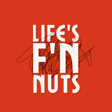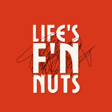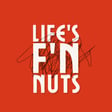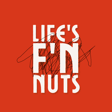Become a Creator today!Start creating today - Share your story with the world!
Start for free
00:00:00
00:00:01

A Portrait of a (Very) Stubborn Artist
Recommended
Transcript
Life Lessons and Early Struggles
00:00:00
Speaker
I don't know what what you want to make of it or what you want to call it, but I do, I have had these moments throughout my life where it really does feel like life is trying to teach me something. Like that things just get flung back in my face in such an obvious way sometimes. Like in a way that cannot be misinterpreted or ignored.
00:00:21
Speaker
Welcome, friends, to life's effin' nuts. I am JR, one man's stories and ruminations on being human in an upside down world.
00:00:37
Speaker
Today, I'm gonna tell a story about ego and control and pride, stubbornness, possessiveness, swimming upstream, all in the context of a young artist trying to make his way in the world, that young artist being me.
00:01:02
Speaker
I have to give a little bit of context, a little like two minute background story.
Artistic Awakening and Performance Art
00:01:07
Speaker
Basically in 2004 on a whim, not even realizing why I was doing it or or how it was going to work or how it was going to play out. i I started going to Bob Dylan concerts and exchanging my writing for tickets. This was in Rochester, New York, the first time I did it in 2004, and I had no idea what to expect at all. And I don't even know where the idea came from. But once I was out there at the show in the center of thousands of people with my little sign, I will trade an original poem for a Bob Dylan ticket, I immediately fell in love. it was I guess it for me it was like,
00:01:46
Speaker
my version of performance art or street performing. I just love being in the middle, the center of a big crowd, just all the energy and all the excitement. And also I loved sort of subverting the capitalist system. You know, these tickets were not cheap. We're talking about anywhere between $50 and $150 for these tickets. And there I am out there trading writing for tickets. So I fell in love with it. I fell in love with it. It was so much fun. And at the time, I was also i was very, very, very, very, very sort of solitude-ness and antisocial. I didn't feel comfortable with people. But in a larger crowd and not sort of in the intimacy of small groups or oneon one-on-ones, I loved it. like It totally brought out the extrovert in me.
00:02:31
Speaker
People would come up and ask me about my writing, and they would ask to see my writing even if they didn't have a ticket and i just I loved it. I loved the interactions, the responses I got. Some people didn't like what I was doing and I found that fascinating as well.
Becoming a Fixture in Sports Entertainment
00:02:43
Speaker
So that started me on this strange path of trading art for for tickets to events and I did a lot of Bob Dylan shows early on and then in 2006 I started trading my writing at Raiders games at the Oakland Coliseum and the 2006 season I got into every single game and the tickets were even more expensive for the Raider games and and I got to a place too where not only was I looking for a ticket or just any ticket I wanted to have a premier seat to the game so that whole season I got tickets in the black hole
00:03:18
Speaker
which is the famous area of the the South End Zone of the Oakland Coliseum, where the tickets go from anywhere between $100 and $200, every single game I got in.
00:03:34
Speaker
and In 2007, I started doing it at the ballpark in San Francisco at Giants Games. And that's when things really took off creatively because I realized that as much as I enjoyed being out there, the idea of doing more performance actually appealed to me a lot more. And so I started writing long verse ballads about baseball, about different Giants players, different Giants history and tradition. And then I even tapped into like the larger baseball tapestry. Writing songs about Satchel Paige and Babe Ruth and Willie Mays and things like that.
00:04:11
Speaker
And I got fairly good at it, i and i and I sort of developed a persona. I had this cool, interesting, like, quote-unquote costume. I'd wear these black slacks, black shirt, this orange tie, this really cool old-fashioned giant's hat, and I became sort of a fixture out there. I would do it right in front of the Willie Mays statue, right on the corner of Third and King. the songs I thought were pretty good and people enjoyed them and and I love to sing so often people would come up to me like I don't have a ticket but can I hear you sing and I would sing these songs and I just adored it. I loved it. It was so much fun. It was so much fun and to this day I still have some of those songs burned into my brain memorized.
00:04:56
Speaker
There was this sort of parallel path for this other project that I was working on. And this is a whole other story for another time. But basically, I developed a correspondence with a sports talk radio host in 2009, eventually convinced him to let me come into the studio to watch the show live.
Radio Gig and Live Sports Poetry
00:05:16
Speaker
And then once I was in the studio, I convinced him to let me get on the air and read some of my baseball poetry. And he let me. and that turned into a gig where once a week I would go on this major San Francisco radio station, 50,000 watt station, and perform this original ballads, sketches, poems, essays about a variety of sports and then I sort of honed my craft even further
00:05:42
Speaker
I started incorporating like blues instrumental tracks and I would read the poetry in time, in rhythm with the music. And so it was this whole cool thing for me. I really, really enjoyed it. I was like in my artistic flow. I loved being on the radio. I loved being out at the ballpark. In 2010, I was sort of reaching my creative peak or or reaching a crescendo of all this creative energy.
00:06:14
Speaker
At one point I went to 31 straight home games. and and saying in exchange for tickets and got into every single game. I got so good at it that I could go with a friend and get two tickets together, like a pair of tickets. Other times I got tickets for sweets, which are hundreds of dollars. I would get tickets in the club section. I would get field club tickets. Like I got really good at it and I became sort of like a fixture at the ballpark too. People would notice me, and would recognize me. I knew all the scalpers.
00:06:46
Speaker
I would get there very early for the games. I would get there like three hours early for the games. I was like part of the scene. All of this coincided with the Giants catching this wave of energy. As my sort of star was rising, the Giants were also ascending. It was this interesting sort of parallel of energy. Here it is. Struck him out! And for the first time since 1954, the Giants are world champions. One thing I did notice though, as the Giants became more popular, as this sort of orange wave was spreading throughout the city, the scene, I could just feel
Artistic Challenges and Rivalry
00:07:21
Speaker
it. it was The scene was growing. There was higher demand for tickets. There was more people at the games. There was a different sort of crowd that was showing up.
00:07:30
Speaker
sort of like a who's who of San Francisco, it became very popular to be at the games. And I did notice that with that sort of shift in energy, I started struggling a little bit artistically. Like I was having a little bit of a difficult time sort of matching the moment. I had carved out this very special, interesting, unique niche for myself. I could just sort of feel the pressure mounting.
00:07:57
Speaker
All of a sudden this guy appeared named Ashcon and he basically did what I'd been doing for several years at that point. He took a a melody, the Don't Stop Believing by Journey melody and added Giants lyrics to it and became like an overnight sensation. People loved it. People fucking loved it.
00:08:26
Speaker
And I felt like very jealous and resentful. like I'd been out there for years doing this thing. And all of a sudden, this guy who I've never heard of comes in. And to me, I also thought it was like cheap art. Like I was using and sort of modifying very old, valid melodies and pretty complex songs. Like some of my songs were 10 verses long and I would spend all day memorizing these songs and and
00:08:58
Speaker
perfecting them. Like to me I thought it was like high art and I felt like what he did was easy and cheap. Like he just put these pretty simple Giants lyrics to this very catchy familiar tune and it just blew up. It blew up huge.
00:09:21
Speaker
He ended up like on TV and like the Giants organization itself invited him to the ballpark and he was on the radio shows. And I was just like floored, man. I was like, I've been grinding and busting my ass for years doing this. And it just felt like this guy showed up out of nowhere and produced what I thought was cheap art and was achieving all the things that I wanted to achieve.
00:09:51
Speaker
I was still doing the radio show at that point. And I went in one Friday after this guy Ashcon had blown up. And I went in to sort of have a response. Because everyone knew, the whole sport the whole San Francisco sports scene knew of Ashcon. It was it was like a phenomenon. So I went in there into the station and openly said on my segment, like, I'm coming for you, Ashcon, like like here's my response to to your art, here's my response art. And I did this very sort of almost like avant-garde, slightly esoteric, I thought well-written, like blues piece. So I use this blues music and I wrote these lyrics and I sort of sang this thing.
00:10:40
Speaker
And totally flopped, I was just not in the zone at all. And at the end ah the at the end of the show, on air, the host was like, that's that's your response for Ashcon? You have this guy out here mopping the floor with you in terms of popularity, and that's what you come in with? And it was pretty devastating. It was pretty devastating. I had just been, like, beaten at my own game. And my pride and my ego and my confidence took an enormous hit. And I remember, like, the low point. I think when the Giants were... They were in the playoffs. And I felt like I'd gotten sort of edged out of the scene. I had just gotten overtaken. Like, this guy just fucking stole my thunder. And so I stopped going to the games. And I remember...
00:11:28
Speaker
Taking a walk down at the Emeryville Marina or the Brooklyn Marina, one of the marinas, I used to hang out there a lot. There was this cold, like foggy evening in October. And I could see out across the bay the lights of of the stadium, and I knew how electric it was down there. I knew that the scene was vibrant and and that the whole city was abuzz. And this this scene that I had been a part of for for years I was witnessing it, but from from all the way across the bay on this sad, cold, foggy evening, me all by myself, like, butthurt and resentful and feeling deposed. And as I'm sadly staring across the bay at the scene that that I felt like had rejected me,
00:12:13
Speaker
I see a newspaper stand, that you know the old the old newspaper little boxes, where you the the old yellow boxes where you pump in the quarters and you get a copy of the San Francisco Chronicle and on the front page of the Chronicle, there's a ah picture of Ashcon on the front page of the Chronicle. And it just felt like it was some kind of fucking bad dream, man.
00:12:38
Speaker
I don't know man I felt like I got like broken up with and here I was just sort of feeling sad for myself and moping and literally looking at the stadium from across the bay on this sad dark cold gray evening in October.
00:12:56
Speaker
For me at the time, I was young and so like my art and my sort of artistic career, if you want to call it that, was by far and away the most important thing to me. Like it was my baby,
Reflection and Embracing Humility
00:13:08
Speaker
it was it was my everything. It was like my complete sense of self-worth and contribution to the world. And I just felt devastated, man. I just felt so, so, so devastated. There was this component where it just felt like a cruel joke. It felt like, you know, that they say stranger than fiction. Like, it felt like a fucking movie. Like, I've literally been out there at that scene for years. Like I said, busting my ass, grinding, putting in the hours, endearing myself to the Giants community, and then all of a sudden, this guy comes out of nowhere. I mean, to me, I just remember that scene so specifically down at the Berkeley Marina or Emeryville Marina. Like, it was so poetic, staring across the bay at the bright lights of the stadium.
00:13:53
Speaker
Looking at the fucking the newspaper rack with this guy it felt like some cosmic joke really you know I don't ultimately know if I believe in cosmic jokes, but in some ways I kind of do like like It didn't feel random also I don't like to be a magical thinker so but perhaps it was just completely random But it didn't feel random like it felt it felt like the universe was trying to or whatever you want to call it was trying to teach me a lesson and trying to humble me a little bit. Because the truth is, in retrospect, I was going against the grain, going against the flow. Like I i i had a chip on my shoulder and i I didn't want anyone to tell me what to do or how to do it. And I wanted to be completely and totally and wholly unique. And I wanted to blaze my own path. For me, in retrospect, that that's a lot of pride and ego.
00:14:45
Speaker
and control. Like this guy Ashcon, he actually had his finger on the pulse of the whole scene, even though I'd been out there for years. And in a lot of ways, I was just in my own head. I was not actually tuning in. to what people wanted, what people needed, what what what the collective feeling was. It was very much about me and my own experience and my ego and my dreams and my desires and my fantasies. And and i've still I still can be sort of stubborn and controlling when it comes to art and creativity. Like I still don't like to be told what to do. I still have an aversion to like following formulas or doing things the easy way.
00:15:24
Speaker
But I think I have learned sometimes to to go with the flow, to not overcomplicate things, to trust that sometimes the easy thing is the right thing or the good thing.
00:15:38
Speaker
And to me, I guess that that's the message. Try to tune in to what's actually happening. You know, it's like the old cliche, like, I don't have to reinvent the wheel. Sometimes the simple, the easy thing is the right thing. I don't know what what you want to make of it or what you want to call it but i do i have had these moments throughout my life where it really does feel like life is trying to teach me something like that things just get flung back in my face in such an obvious way sometimes like in a way that cannot be misinterpreted or ignored. yeah I could not ignore the picture of Ashcott on the front page achieving the kind of recognition that I so dreamed and desired. I wanted it so bad to be recognized, embraced, loved, valued, so bad, really, so badly.
00:16:28
Speaker
It's a good lesson for me to remember to not be afraid of the simple, the easy, the predictable, to not fight and struggle and grind and contort as much as I do, just to chill a little bit, to sort of tune into what's happening rather than my own Viewpoints, my own biases, my own grudges, my own chips on my shoulder. Just try to tune into what's actually happening, what's actually needed, what I'm actually seeing, what I'm actually hearing. Focus on others, not myself. Poetic and interesting, the way that sometimes life just smacks me in the face with lessons in a way that I can't ignore.
Conclusion and New Beginnings
00:17:13
Speaker
Thanks for tuning in to Life's F&Nuts. I hope you enjoyed that story. New episodes drop every Tuesday on Apple Podcasts and Spotify, and you can follow us on social media at Life's F and&Nuts Podcasts. I'm JR. See you guys soon.



